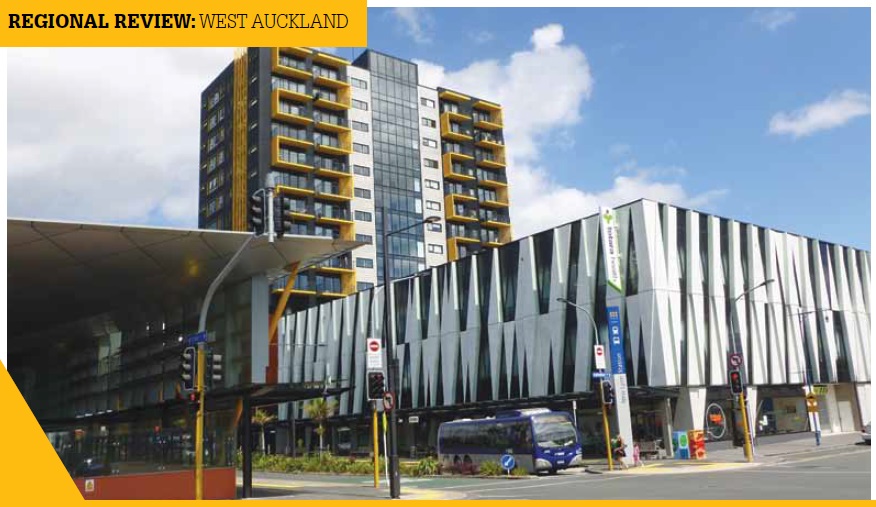
An apartment at Merchant Quarter recently sold for $50,500 over the 2013 purchase price
No other region in the country has an identity as strong as West Auckland. We saw it in the story-lines of Outrageous Fortune, the comedy of the late Ewen Gilmour, and Paula Bennett coming into Parliament on the slogan, “Proud to Be a Westie”. The stereotype of a black jersey-wearing, V8 car-loving resident of the western suburbs of Auckland is ingrained.
The truth is far from this picture. Inner West Auckland is a mix of suburbs, from multi-cultural Avondale, to the wooded, arty village of Titirangi. Blockhouse Bay has wide views of the Manukau Harbour. You can launch a kayak off the back of some sections in New Lynn and paddle the Whau River. Residents of Te Atatu talk about “the Peninsula” and rave about their city and Sky Tower views. Out in the north-west corner, Westgate is the largest urbanisation project in New Zealand.
But with huge infrastructure making West Auckland ever more accessible to the CBE and connected to motorways, it has become a hot spot in the rapid simmer of the Auckland property market. Property prices are escalating rapidly and rents are following suit.
Yet, a property frenzy seems far removed from the orderly streets of Blockhouse Bay, a niche, village suburb that borders the Manukau Harbour. When State Highway 20 extended to Maioro Street, it made the area attractive to those who work at Auckland International Airport.
Chris Dever-Young, branch manager of Barfoot & Thompson Blockhouse Bay, cites a recent auction: “It was an older three-bedroom home with a bit of a work to do, on a right of way with four others. We had a pre-auction offer of $650,000. It sold for $698,000.” A rental appraisal on the property was $460 to $480 a week.
Better overall return
Mark Hewett is an investor with a portfolio of properties in Blockhouse Bay. As a builder, he began with spec builds to sell. “Then about 13 years ago, I realised the better idea was not to build and sell, but to hold onto my properties as long-term rentals for a better overall return.”
“The area has changed a lot,” he says. “It used to be a bit of a retirement place, but now we are a place where families want to be.” He says the local Blockhouse Bay Primary School is a drawcard. “In my role on the [school] board I see the demand for out of zone enrolments.”
In Blockhouse Bay, rents are experiencing moderate rises from $10 to $30 a week, but nowhere near keeping pace with the house prices, according to George Hart, rental property manager at Barfoot & Thompson. He still has mostly families seeking Blockhouse Bay for its community feel, but as the accommodation squeeze comes on he is starting to get groups of flatmates, or two couples wanting a house together.
Around the corner from Blockhouse Bay, New Lynn is a major transport hub in the Auckland City Council’s infrastructure plan and a Special Housing Area. Its retail centre, Lynn Mall, is undergoing a $50 million dollar upgrade.
Chris Dever-Young’s Blockhouse Bay office was involved in marketing the striking Merchant Quarter Apartment building, which sits above the $160 million New Lynn Interchange train station. These high-rise apartments were a first for New Lynn. The first stage offered 110 units, from studios to two bedrooms, most with a carpark included. They sold with an approximate breakdown of 60% owner occupiers and 40% to renters. A recent resale in the New Lynn development was for $320,000, bought off the plans in March, 2013 for $269,500. A second stage of 20 two-bedroom townhouses have been pre-sold; construction is due to start this year.
Similar prices
Kevin He, a sales agent at Barfoot & Thompson Blockhouse Bay, was involved in the initial sales. “Per square metre, these apartment prices were similar to the likes of Newmarket. These were high prices at the time for New Lynn, but show how we are becoming seen as a central point in the city.”
Long-term property investor, Andrea Sulikosky, has properties in New Lynn, and is excited by the developments in the suburb. “New Lynn’s transformation had to happen, and it is happening. It’s a really positive development to have intense housing with infrastructure around it.”
Further west, Phil Freeman, is the franchise owner of Blue Fern Realty, a chain of five Harcourts offices, with its flagship site in Henderson. “I started selling real estate in West Auckland in 1993,” he says. “At that time Sturges Road was all orchards and grapevines. Sub-division started and newly developed sections sold for $95,000. Now, a house on those sections would sell for up to a million dollars.”
Sturges Road is so urban it has its own train station, part of the Western rail line due for electrification this year. The grape growers are gone. Babich Wines, iconic West Auckland wine makers, recently sold their 88 ha land-holding, although the winery remains.
With healthy capital gain, home owners have improved their properties and undesirable areas have gentrified. “Metcalfe Road,” Phil Freeman says, “Rumour used to be that that was where you went for a drug deal. Certain pockets in there anyway. [Recently] we listed a house in Metcalfe Road on the Thursday. By Sunday we were able to present multiple offers to the home owner. He had paid about $250,000 for it eight years ago. The offers we were able to show him, ranged from $480,000 to $512,000.”
Faster growth rate
There’s no shortage of tenants as West Auckland is growing at a faster rate than much of the rest of the city. The Auckland City, Henderson and Massey Local Board Plan says: “In mid-2014 in West Auckland, 643 applicants, including families, were on the waiting list for Housing New Zealand (HNZ) houses. No HNZ houses were available, and less than half of the homes required were advertised as being available on Trade Me.”
Property manager Nadine Stone, from Blue Fern’s Henderson office, says demand is unrelenting. “Pretty much we will find a tenant in around in 48 hours for a listing.” She sees prospective tenants responding to the tough competition, “We are starting to see people packaging up their applications with everything from a copy of their passport to bank statements.” Rents are steadily rising, with one landlord replacing a long-term tenant, able to raise the rent from $400 to $470 a week.
Nadine sees strongest demand in the area of Western and Henderson Heights, where families are keen to be in zone for Decile 7 primary schools, Western Heights and Summerlands. A three bedroom home here rents for $500 to $550 a week. In Hercules Drive in Henderson Heights, a three-bedroom plus study home is going to auction with a recent CV of $640,000 and has been appraised for rent at $540 to $560 a week. Three-bedroom houses in Massey, further out, and less desirable, rent for $400 to $450 a week.
Stuart Robertson is a sales agent for Blue Fern in Glen Eden, whose catchment includes Titirangi. “Titirangi is New Zealand’s premier bush suburb,” he says, comparing it with such other boutique Auckland villages as Mt Eden or Devonport. “Plus, it’s the gateway to the west coast beaches. Its natural beauty is protected by the Waitakere Hills Preservation Act, which means many of the sections cannot be subdivided.” Its desirability and limited stock has positively influenced the neighbouring suburb of Glen Eden. Robertson believes this is one place where there is still good value for investors.
“Glen Eden has a good range of properties, from new builds on in-fill sections, to 1960s and 1970s construction, to old villas that may have been farm houses on the original market gardens. It has a great feel, from urban to semi-rural.”
Boom and busts
Andrea Sulikosky started investing in 1992, and has properties throughout the west, in New Lynn, Glen Eden, and Waterview, but her most effective is in Glen Eden. “I have a villa converted into four one-bedroom flats, which now has a very impressive return,” she says. She has seen the boom and busts in Auckland and has revised her strategy through the years, moving from single family dwellings and into flats, home and incomes and units.
Space to spread is not the problem at Westgate. A total of 435 ha will be urbanised. The numbers are staggering. A $1.1 billion dollar development will see the retail centre expand to five times the size of the present Westfield Mall. It will include a town square and new library, plus a six ha park. Due for completion in 2016 are 5500 new homes and apartments. There is potential for 20,000 extra jobs in the next 12-15 years.
Investor David Whitburn, former executive officer for Auckland Property Investors Association and strategic manager of Fuzo Property group, says his pick of the area surrounding Westgate for investors is Massey West. “This has not yet seen the full benefits of the ripple effect of rising house prices,” Whitburn says. “Nor is it fully priced for the game-changing growth of nearby Westgate Town Centre which will provide West Auckland with its first truly credible office address.”
Whitburn’s other hot spot recommendation is Kelston: “The yields are good for two bedroom units and also four bedroom houses as the sale prices are significantly lower than surrounding areas, such as New Lynn and Glendene. HNZ are selling down some of their portfolio in the suburb to further assist it to gentrify. The schools in the area are seen as good. Legendary All Black coach Sir Graham Henry was once headmaster and coach of the First XV at Kelston Boys’ High School.”
Remedial work
With prices rising out of the affordable range, Mark Hewett sees difficulties for those starting out in property investment in many areas of West Auckland. His developments focus on subdividing sections, either removing an existing house or building around it. “It’s one way to save money on the price of the section. For those with building skills, sometimes you can get a bargain by taking on a leaky home and doing the remedial work yourself. And there is still the odd do-up out there.”
But if you’re prepared to look hard, there are definitely opportunities to be had in West Auckland. And with so much infrastructure and expansion happening, the long term prospects for capital gain in the area are possibly the best in New Zealand.





 Search
Search
